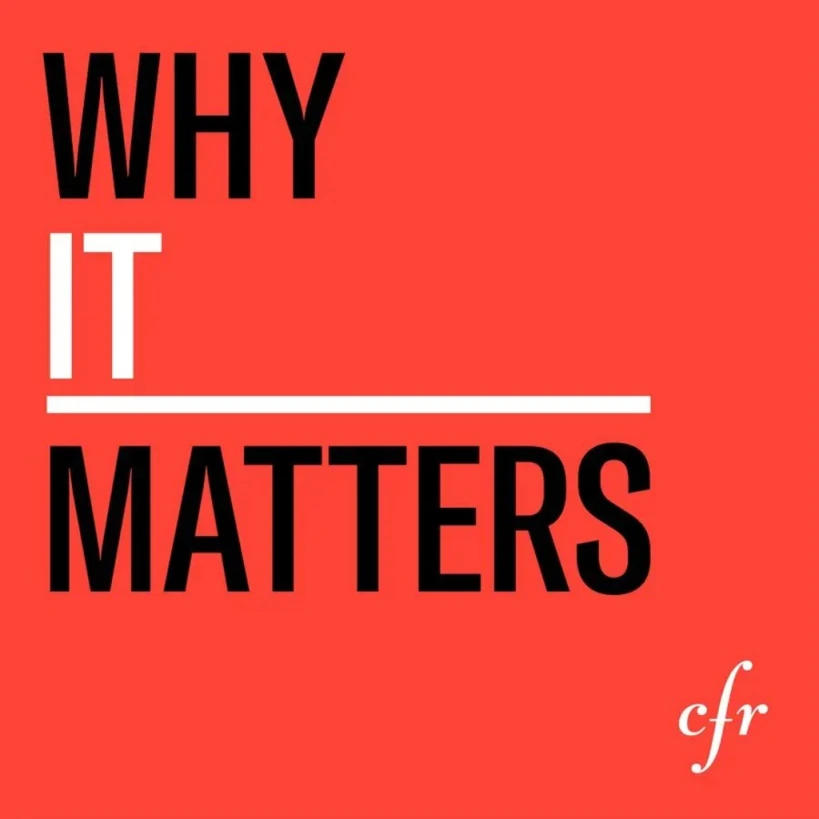Perspective on Afghanistan, With Richard N. Haass
In this special episode, CFR President Richard N. Haass examines the war in Afghanistan and the lessons to be learned in its wake.
Published
Host
- Gabrielle SierraDirector, Podcasting
Guest
- Richard HaassPresident Emeritus, Council on Foreign Relations
Supervising Producer
- Asher RossLead Content Strategist
Audio Producer and Sound Designer
Associate Podcast Producer
- Rafaela Siewert
Senior Producer
- Jeremy SherlickDirector, Video
Show Notes
The U.S. withdrawal from Afghanistan, and the Taliban’s swift takeover of the country, has prompted a moment of national debate about the war’s cost and legacy. Many are asking what went wrong and what the conflict accomplished.
For insight, Why It Matters turned to CFR President Richard N. Haass, who has spent four decades studying and advising on Afghanistan. As head of policy planning for the State Department under U.S. President George W. Bush, and later as U.S. coordinator for the future of Afghanistan, Haass was in the room when many of the earliest and most important decisions about the war were shaped. In this episode, he offers his critique of how the war unfolded and raises potential lessons the United States should consider as it turns its eyes to future challenges.
Dig Deeper
From Richard N. Haass
From CFR
“The U.S. War in Afghanistan,” Zachary Laub and Lindsay Maizland
“We All Lost Afghanistan,” P. Michael McKinley, Foreign Affairs
“The Taliban in Afghanistan,” Lindsay Maizland
“Biden Was Right,” Charles A. Kupchan
“Global Conflict Tracker: War in Afghanistan,” Center for Preventive Action
“The Legacy of the U.S. War in Afghanistan in Nine Graphics,” Lindsay Maizland
Read More
“Fear Spreads in Kabul as Taliban Take Charge,” New York Times
“Around the halls: The Taliban retakes Afghanistan,” Brookings Institution
“Live Updates: Taliban Consolidate Control in Afghanistan,” Wall Street Journal
Watch and Listen
“President Biden Remarks on Afghanistan,” C-SPAN
“The Fall of Afghanistan,” New York Times
Transcript
So, like many of you, we at Why It Matters have been watching the news coming out of Afghanistan. The United States’ 20-year war has come to an end, the government we attempted to build there has failed, and the Taliban has retaken the country with breathtaking speed. For many of us it is a time of reckoning about what went wrong.
The war began as a direct response to the 9/11 attacks, and the Taliban’s refusal to hand over the members of Al Qaeda that perpetrated them. But as the years dragged on, many Americans lost track of why we were there, and what the mission was. Many young Americans don’t recall a time when we were not at war in Afghanistan.
The debate is going to continue for years to come, but one thing is certain, we have to try to learn the right lessons from Afghanistan. So, in an effort to start learning those lessons, we thought we would do something different this week.
Usually on the show we feature several guests with differing opinions. We think that’s important. But today we are just going to have one guest, and he’s my boss, Richard Haass, the President of the Council on Foreign Relations. We spoke on zoom, and the team decided to release the conversation with minimal editing.
The views you will hear are his own. We spoke to him because he has spent four decades studying and advising on Afghanistan, and serving under four presidents. He was in the room when many of the most important early decisions about the Afghanistan War were debated and shaped.
There’s a lot on his resume, but here are a few things you should know. He was in the State Department in the 1980s when the Reagan Administration attempted to counter the Soviet invasion of Afghanistan. He later worked at the National Security Council under the first President Bush, where he attempted to implement a post-Soviet policy for the country. Most importantly, he was the head of policy planning for the State Department under the second President Bush when 9/11 occurred, and became the U.S. Coordinator for the future of Afghanistan in the period that followed. He left the Bush administration in 2003 to become the President of the Council on Foreign Relations.
I’m Gabrielle Sierra, and this is Why It Matters. Today, Richard Haass on the Afghanistan War.
Gabrielle SIERRA:
Welcome to the show, Richard Haass. So, it’s quite a timeline you’ve had. An incredible amount of experience this whole way. So to dive into some of these pieces, you know let’s go back a bit. Based on the reality at the time, do you think we were right to go into Afghanistan?
Richard HAASS:
We were 100% right to go into it, and, we didn’t want to do it. We gave the Taliban a choice. The Taliban made the wrong choice, a fateful choice for them. 3,000 people have died in our country in a day. But also the precedent. We thought it was critical to set the international norm that we wouldn’t distinguish between terrorists and those who supported them. So I think that was 100% right. We hadn’t thought through, a whole lot, what we would do afterwards. We didn’t know how long this would take. But then again I think we made the right decision to help the Afghans forge their own government. The feeling was if we did too much, it would lack legitimacy. We thought it was important to come up with an Afghan leader, also who was Pashtun, not from one of the northern tribes. And Hamid Karzai emerged as that person. That was the only thing that was clear. After that, and I expect we’ll talk about it, there wasn’t a clear plan and there wasn’t consensus within the administration over what ought to be the trajectory of US policy. How ambitious should we be? What was our definition of success at that point? And that’s where things began to break down.
SIERRA:
I mean, I remember this early phase a bit. You know, how effective were we at diminishing the terrorist threat to the United States? Because I remember, at the time, everyone was talking about the War on Terror.
HAASS:
Well, the War on Terror became an important part of American foreign policy. But the Afghan dimension of it had been dramatically reduced. And the War on Terror became a global preoccupation, particularly in parts of the Middle East and Africa, because that’s where various cells of terrorists set up shop. And what we discovered, groups like Al-Qaeda and others, they were global. They had access to money. They had access to guns. They had access to people. And that phase of American foreign policy began 20-odd years ago, and it’s still happening. It’s still taking place, largely but not exclusively, in the Middle East and Africa. It’s also taking place in parts of Asia. And, to me, it’s open-ended. I mean, here we are, we’re meeting at a time we’re battling a disease. I think there’s some parallels. There’s an open-ended quality. You don’t eliminate terrorism anymore than you eliminate a virus. These are now baked into the world of the 21st century. So I think it’s an open-ended challenge, though for a moment, where it had come to us most painfully and vividly, was out of Afghanistan. I should be clear for those who don’t know, the history of that is where the terrorists involved in 9/11 had been trained, where they had gotten support. They weren’t Afghans, most of them were from Saudi Arabia and elsewhere in the Middle East. But this is where they had been supported. This is where things were organized. This is where Osama Bin Laden was hanging out. But with the removal of the Taliban pushing the Al-Qaeda out and the Taliban out, most of whom went to Pakistan, Afghanistan was no longer the epicenter of world terrorism. It essentially had dispersed.
SIERRA:
So, how did our reason for being in Afghanistan change through the years? You know, what were the competing views on what should be done after the initial phase?
HAASS:
It’s the most important question and I’m glad you asked it. Because it’s something that comes back to haunt us in many ways. So we had successfully worked with our Afghan partners, removed the old authority, we had helped bring about a new authority, led by Mr. Karzai. And then the question was, well what do you do at that point? They weren’t strong. The feeling was we couldn’t just leave them to be, because we knew that the Taliban had moved to Pakistan. But the question was, how do we stand them up? How do we build them up so they could be something approximating a normal country? We weren’t talking about democracy at this point, we were talking about building up the capacity of this post-Taliban government so they could police their borders. And they could police their country so that terrorists would not once again use Afghanistan as a piece of real estate. And the debates we had within the Bush Administration, again this is Bush 43, and I remember them painfully and vividly was how, to put it bluntly how ambitious should we be? And one of the phrases that’s commonly now booted about is nation building. And what that really is, is capacity building. What kind of capacities or sometimes called state building ought we to try to bring about? And what I was proposing was that the United States and other international forces would come to Afghanistan temporarily. We already had some. We would stay there temporarily and perform two functions. One was we would help the new government consolidate authority over Afghan real estate, it’s a large country. And secondly, we would help develop, train, a force. Wasn’t clear how national it would be as opposed to regional, but we would help stand up an Afghan army. All I can say is there was remarkably little enthusiasm within the US government for doing it, remarkably little. I’m used to being unsuccessful in my policy proposals, but even in my career of unsuccessful attempts to influence policy this stood out. It was one of the most painful national security meetings I had ever attended. There just wasn’t enthusiasm. If I had to boil it down Gabrielle, I would say it reflected two things. One was pretty legitimate, which was why do we wanna get ambitious in Afghanistan? This is a country with little tradition of a strong central government. It’s very tribal, it’s regional. This is just the wrong place for us to get ambitious. And I think that was a legitimate concern. The other concern, less legitimate, is there was much more excitement about getting involved more in other parts of the world i.e. Iraq. And the feeling was that that was a place where if we did invest we would have more to show for it. Iraq was a potential democracy. Iraq was a model that other Arab countries might emulate. Afghanistan was seen as an isolated one-off. So it was not only seen as a poor prospect, which again I think was a legitimate concern, it was seen as a poor investment. What I said was we had a window, the Taliban had been routed, our authority was really high. We needed to build up authority. You can’t remove an authority and then not try to put something in its place. And for those who question me on that I have one word for you, Libya. Under the Obama presidency, the United States went in and removed Gaddafi and never put anything in his place and Libya became a failed state. And what we learned in some cases is that bad situations can get worse. So my view on Afghanistan, I didn’t have that example at the time, was to say we’ve gotta try to do something. Let’s not get overly ambitious, but let’s also not get under ambitious. We have a moment here. And I thought we would have significant international help, and I said for a short time we could do this, but there was just simply no enthusiasm for it. And if you look at the history, what happened subsequently is the rate of if you will nation building or capacity building or army building in Afghanistan, it was incredibly slow, glacial may be an exaggeration but not too much of one. Meanwhile, this was not happening in isolation. What else was happening? So we were building up the Afghans at I think a terribly slow rate, but the Taliban was rebuilding and reconstituting at a pretty good clip.
SIERRA:
Right.
HAASS:
Why? Because they had set up shop in Pakistan. And whereas initially we had gone to the Pakistanis, it turned out one of the senior members of the Pakistani government had been in Washington on 9/11. And we read them the Riot Act that the State Department, Rich Armitage, the deputy secretary. And initially the Pakistanis cleaned up their act, but over time things kind of went back to business as usual. And you had the Taliban openly operating out of Pakistani cities. And the North-West Frontier Province of Pakistan became a giant sanctuary for the Taliban. And one of the things history says, it’s very hard to prevail in a “civil war” if one of the parties has access to a cross-border sanctuary. Which is exactly what happened. So we had two dynamics, a very slow dynamic of building up government capacity, and a rather healthy dynamic or fast dynamic, which was unhealthy, of the Taliban reconstituting itself.
In part because the US military had failed to stop them from escaping, and then we kind of took our eye off the ball and Pakistan went ahead and allowed the Taliban to regroup and rebuild. So that’s where we ended up. By then, I had left government years before in the summer of 2003 to take my current job. But this is what happened, over the course of the Bush years. And then by the time the Obama administration got in then the Taliban had resumed all sorts of efforts within Afghanistan. The situation was beginning to deteriorate, and by then we made the fateful decision to dramatically increase American forces.
And the problem with surging US forces is one, by then we clearly had overstayed our welcome in Afghanistan. Two, as I said we had allowed the Taliban to rebuild. And three, the fact that we were surging forces increasingly involved in combat against a reconstituted Taliban meant that US casualties went way up and the cost of the war in every definition of the word cost went way up. So Afghanistan went from being the “good war” to simply the second bad war. And that happened during the time of the Obama administration.
SIERRA:
So, you testified before The Senate Foreign Relations Committee and expressed your skepticism that the surge in Afghanistan was a good choice. I think at the time, you said, that we may have to accept a situation that is just good enough in Afghanistan.
HAASS:
The surge was a kind of an attempt to be decisive, in a situation I didn’t think we could be decisive. That it wasn’t gonna end in military victory, it wasn’t gonna bring about the Taliban yelling uncle for peace. So, I favored over the years, was something more modest. The idea of Afghanistan good enough? or Iraq, good enough? I actually think is an important one. Americans tend to see situations as problems, and anytime one hears the word “problem,” one immediately expects to see the word “solution.” And the problem with thinking of things as problems, now that I’ve totally muddled it, is that lots of things are really situations, and by definition, situations cannot be solved with military force or any other policies. At best, they can be managed. Which often means not what you can bring about, but what it is you can avoid. I wanted to dial down our ambitions and simply say, here’s what we want, we want to avoid a Taliban takeover of the major cities. Can’t stop the Taliban from making some inroads. So, what we wanna focus on is a situation we can help sustain at an affordable cost. This argues against the surge. A surge was looking for a decisive blow in a situation where there simply was not a decisive blow. I think we’ve gotta be modest about what we ask military force to do. I have Colin Powell, before he was Secretary of State, as you know, he was a General, and he said, you know, military force is good at destroying things. What military force can do is create a context in which other things can happen, but my own view is, we often turn to it too often. But, look, going back to your immediate question, yeah, I traffic in ideas, like anybody else, I look at history. I try to make sense of what’s going on. I offer recommendations, and whether I’m in government or out of government. And, you know, I’ve spent decades in government and decades out of government. It’s not only that I’m wrong sometimes and perhaps right sometimes, but also, you know, there’s times you get listened to and times you don’t. And it’s just frustrating when the times, it’s not that you don’t get listened to. It’s on those occasions where you might have been more right than wrong, and the consequences of what we did are really costly. Those are the things that keep me up at night, and Afghanistan falls into that bucket. There’s things about Afghanistan and we’re seeing them play out before us now, that if you’re not frustrated by them, if you’re not made a little bit sick by them, by what we’re seeing, then you’re not paying attention.
SIERRA:
I guess that brings me to a question of does nation building ever work?
HAASS:
Sure. I mean the most famous successes are places like Germany and Japan after World War II.
HAASS:
These were defeated, then occupied places. So the question you have to ask is why did it work there? And you look at the characteristics of these societies, highly educated, highly homogenous, in many cases, societies with strong national traditions and so forth. None of these things were present in Afghanistan. So again it was not a good candidate, I get it. The question was, I didn’t see clear alternatives at that point. Now I couldn’t guarantee it would work. But I thought it was worth a limited investment. I didn’t think it was high risk at that moment because we had tremendous authority, we had tremendous momentum, the Taliban were gone, Al-Qaeda was gone. So I thought there was a window. And my view was let’s take advantage of this window. Worse comes to worst it won’t work. Okay, then we can deal with the consequences of that. But we were not willing to give it I thought a serious try, and that set in motion a situation where the government of Afghanistan was never able to do what it needed to do. We misguidedly took on an ever larger role. So we became not just the nation builders behind the scenes, we essentially became a protagonist in their civil war. And that seemed to me an escalation that was unwise. But I’m worried here, that wars are always fought three times. There’s the question of whether you fight a war, there’s the fighting of the war and then it’s the lessons. And what worries me a little bit about this is that we could learn the wrong lessons. I don’t think the lesson ought to be that nation or state building is always wrong, it’s always destined to fail. I think what we really need to think hard about is what are the conditions which we think are positive, and what are the techniques? What have we learned about sequencing? What have we learned about pacing? What have we learned about how do we adjust for local culture and history? And the reason this is so important, we don’t want to be doing everything ourselves around the world. But there’s dozens of governments around the world we need to help, and particularly in the Middle East, particularly in Central America, particularly in Africa. And so we had better learn some of the correct lessons of nation building rather than to say well it’s never worth it, or it’s never a good idea. That seems to me we either live in a world which is much more dangerous, or we confront ourselves with having the United States get involved directly in combat operations in more places, and I sure don’t want that.
SIERRA:
I mean look, one of the things that I can’t help but think about is, you know, the women, right. I mean, this is something that has been told to us in the messaging of why we were even still in Afghanistan, the repression of women. And these women saw a level of freedom, and now they saw this chance disappearing. You know, you mention culture, what responsibilities do we have to a society and to a culture when we come into a country and leave?
HAASS:
You’re asking big questions today, and I’m not going to avoid your question, but it’s not an easy one. Look, this is one of the fundamental debates in American foreign policy. To what extent should American foreign policy be about shaping and influencing the external behavior of other countries? Essentially, to what extent should American foreign policy be about influencing the foreign policy of others? And to what extent should what we do in the world be about influencing the domestic behavior, the nature of others?
The problem is with that, often our influence is limited. Often we have other priorities. Maybe the single most ambitious task you can imagine you can set for yourself, is to try to change the internal workings of another society, particularly one with a long and deep culture. So I take from this, yeah, we have values here, but we’ve got to understand in some cases the limits to our influence, that we can’t always translate our preferences. I don’t like this.
I still remember a dinner party where I made this argument about the Middle East, and I was excoriated, I think is not too strong of a word. Hammered, might be another word by a prominent former policy maker on the basis of, I was selling people short in the Middle East. And I was actually accused of a kind of racism, that not everybody was ready for democracy. And I said I wasn’t making a statement about individuals. I was making a statement about cultures and societies. And you know, I’d studied enough anthropology and sociology and enough about the Middle East in particular where one had to be aware of pre-conditions and resistance to certain types of traditions. And I take that as simply, I don’t like it. I like the idea that everybody in the Middle East would read the Federalist Papers, an Arabic translation, and that people in Afghanistan would be reading it in Dari or whatever, but it’s not necessarily going to happen.
So, I think we have to decide what are the limits to our influence, what are our priorities. What are those things that American foreign policy is well suited to do? What are those things that are, that are a reach? We’re about to have a clinic in that in Afghanistan because look, I worry profoundly about what’s gonna happen, yes, to girls and women, first and foremost, but really to Afghans of any gender, and not just those who are working with the government or with us, about people who want to have a 21st century life. I worry and wonder. And, I worry about what’s going on in other parts of the world. Afghanistan is not unique in the sense of those kinds of concerns, but we can’t impose our preferences on others. I think the best thing we can often do is our example. And our example, by the way, is not what it could and should be right now. So, whether it’s to take an example of our democracy, or the example of our economy, the example of, our physical health, our social health. I mean, there’s so many ways we can make this a society worth admiring and emulating. That might be the best way in many cases we can spread our values, but I don’t think we’re in a position. Look, we couldn’t convince Myanmar. Think about the discrepancy between the power of the United States and the power of Myanmar. We can’t oust the military junta that took over there. Doesn’t that tell people something? There’s a limit to our influence in the world. And you know, we may be on the side of right and morals and virtue, but that’s not necessarily the way history plays out.
SIERRA:
But it’s such a fine line, isn’t it, between spreading and setting a good example, and imposing?
HAASS:
So, you’re right. And I don’t mean to caricature. So there are things we can do. And we can, through foreign aid, do certain things, through sanctions, discourage certain behaviors. Through educational opportunities here, we can do things. But there’s still limits.
If the Taliban wants to impose Sharia Law, wants to make, wants to force women to wear a niqab, full covering. I don’t think we’re gonna be in a position to stop it. Now we might say, “Well because of these things, we’re not gonna provide you with this or that kind of aid.” Or, okay, and they may simply shrug their shoulders and say, “So be it,” and they may be able to find the support they need externally from other places, be it Pakistan or China or Russia, who tend not to care about such things and have other priorities. So again, we can have a foreign policy in part which tries to more directly promote certain behaviors, certain norms, certain standards, but let me ask you a question. Just say what should we care most about in Afghanistan? And the priority has been that it not become a place where terrorists again operate out of. That’s got to be the single most important thing.
That, if you will, is a more classic foreign policy interest. And as we showed on 9/11, after 9/11, we have mechanisms to act with if that standard is not met by the Taliban. They may have internalized that lesson. We’ll see whether they have internalized that. But no one is gonna launch an intervention in Afghanistan over Sharia Law or the fact that women are treated abominably, as bad as that is.
So, again, it’s one of the reasons I didn’t want us to get to this point. It’s one of the reasons, that I favored the United States maintaining a small presence in Afghanistan not because it would mean peace, not because it would lead to a military victory, but I thought it would avoid some of the scenes we’re either seeing or are likely to see in coming days, weeks, months, and years. And that, to me, was a consideration, the fate that would likely befall girls and women, as well as men in Afghanistan.
SIERRA:
Yeah. It just feels sometimes like a very fair weather argument where, you know, people have used that defense to stay in Afghanistan in the past, and now we can get up and leave and abandon everybody.
HAASS:
Well, it will have consequences. You know, I’ve disagreed with this president’s policy on Afghanistan, as you know, from what I’ve said and what I’ve written. His argument was that he was not prepared, as gut wrenching as it is, to have American forces stay in Afghanistan longer, potentially put themselves in harm’s way, in order to deal with the issues you’re raising. That it was one thing to deal with Afghanistan as a terrorist haven. It’s something else to deal with it as a human rights nightmare. And he was basically saying, we will turn to diplomacy. Well quite honestly diplomacy ain’t gonna do a lot.
Mr. Biden had inherited a situation that was a kind of cake and eat it situation. We had a small military presence. Americans hadn’t been doing combat operations, I don’t know what, for six, seven, eight years now. I’ve lost count. Hadn’t had a combat fatality for a year and a half. That we had managed to get to a point where the benefits and the costs were not out of line, and one of the benefits are the issues you’ve raised, the quality of life in particular for Afghan girls and women.
The president wasn’t willing to take the risk that the costs of presence would go up. He obviously didn’t want to face the decision of having to increase US forces if the security situation deteriorated, so he’s essentially initiated a policy that’s brought about a truly, I think a set of terrible outcomes. And my guess is he would say, “I don’t like these outcomes anymore than you did. I was just not willing to take the risk of what the price would be of our staying.” And look, I’m not gonna sit here and say that’s not a legitimate set of concerns. I actually think there’s legitimate debate, not over the way the withdrawal was designed and implemented. That was terrible. But I think there is a legitimate debate, about whether the agreement signed by the Trump administration in February of 2020.
I think that was a terrible agreement, to get us out and undercut the government, it virtually asked nothing of the Taliban. I was the US Envoy to the Northern Ireland peace talks. We asked much more of the provisional IRA in Northern Ireland than we ever asked of the Taliban. Just saying. We demanded a cease fire. We demanded they give up their arms. We didn’t either with the Taliban. The Taliban got off so, so, so easily.
This was not a peace agreement. This was an American withdrawal agreement. I thought the Trump administration was dead wrong to do it. I thought Mr. Biden, who’s had no trouble distancing himself from other things he inherited from Mr. Trump on Iran, on climate change, on the World Health Organization, should have distanced himself from this, but he didn’t. Essentially, followed it.
SIERRA:
But public opinion, everyone wanted, you know, mostly did want to get out, right?
HAASS:
Well I didn’t see a lot of intensity. Sure, if you ask people, do you want to get out, they’ll probably say they want to get out of most places. Unless I missed it, most people, when they ask people, why did you vote the way you voted in November ‘20 I didn’t notice people saying Afghanistan.
SIERRA:
Right, right.
HAASS:
The protests we had in, ‘20 and ’21 were about race issues, policing issues. We’re not about Afghanistan. This was not the Vietnam War.
SIERRA:
Yeah.
HAASS:
So, you know, again, policy is not necessarily made on the idea of popularity. That’s why we don’t have referendums every day in this country. Well, we have a representative government, where leaders make tough decisions. The fact that Americans may today say they like the fact we’re out, well how much would they like it if in a couple years we face problems of terrorism? How much will they like it if human rights atrocities happen? I don’t think you can conduct foreign policy on the basis of short-term popularity.
SIERRA:
I’m sure you don’t love that people neglect foreign policy a bit in their day-to-day decisions and their voting, and then focus on this type of thing.
HAASS:
Look, it is, what it is, what it is. And I wish there were more consistent interest in the world, particularly since we’re living in a world. Coming back to the theme of this podcast you host. You don’t have to look very far to see how the world matters. We’re up against the 20th anniversary of 9/11. Where 3,000 people died here in a day. We’ve been talking about on your show, COVID. More than 600,000 Americans already have lost their lives from a disease that broke out in Wuhan, China, however it broke out. We are dealing with the growing terrible effects of climate change, which is, if you will, the cumulative effect of activity, everywhere. What we put in cyberspace now is no longer safe. We can’t even protect our own cyberspace from other people putting things in there we don’t want.
HAASS:
So, people may not be that interested in the world, but the world’s interested in us. That seems to me simply a fact of life. And the reason foreign policy’s so important is what we do and don’t do have, in turn an impact on the world. There’s a loop here. The world influences us. We can influence the world. And I think what’s interesting about Afghanistan, if you look at the last 20 years, I think there’s been, moments, some moments we got it right, I think after, again, 9/11, I think we got it initially right. I think along the ways, we’ve done too little and we’ve done too much. You almost, I almost, wish you’d invited Goldilocks on your show instead of me.
SIERRA:
Ah, you know, she was so busy today. I am sorry about that.
HAASS:
(laughs)
SIERRA:
Yeah.
HAASS:
But, if you look at the history of the last 20 years, you could almost form two columns, the times we have overreached in Afghanistan, and the times we have under-reached. And the last couple of, I’d say the last 18 months, there’s been a lot of under-reaching. What I was talking about, I think, after, right after 9/11, early on in 2001, 2, 3, I think we under-reached in some of the nation-building. Controversial, I get it. But clearly with the surge and other things, we overreached. We put too many forces, but that’s the kind of conversation we need. I think it’s important to come away with the right lessons. The only thing worse than making mistakes is not learning from them.
SIERRA:
Well, on that note, Richard Haass, thank you for joining us on Why It Matters today.
HAASS:
Always a pleasure. Good to see you.
SIERRA:
Good to see you as well.
For resources used in this episode and more information, visit CFR.org/whyitmatters and take a look at the show notes.
Have a question or some feedback? Just feel like saying hi? Send us an email at [email protected].
Subscribe to the show on Apple Podcasts, Spotify, Stitcher, or wherever you get your audio. And if you are a fan, we’d love it if you could leave us a review. Ideally a good one, the more stars the better. It really does help us get noticed.
Why It Matters is a production of the Council on Foreign Relations. The show is created and produced by Asher Ross, Jeremy Sherlick, and me, Gabrielle Sierra. Our sound designer is Markus Zakaria. Rafaela Siewert is our assistant podcast producer. Sophie Yass is our summer intern.
Robert McMahon is our Managing Editor, and Doug Halsey is our Chief Digital Officer. Original music is composed by Ceiri Torjussen. Special thanks go to Richard Haass and Jeff Reinke.
For Why It Matters this is Gabrielle Sierra signing off. See you soon!






